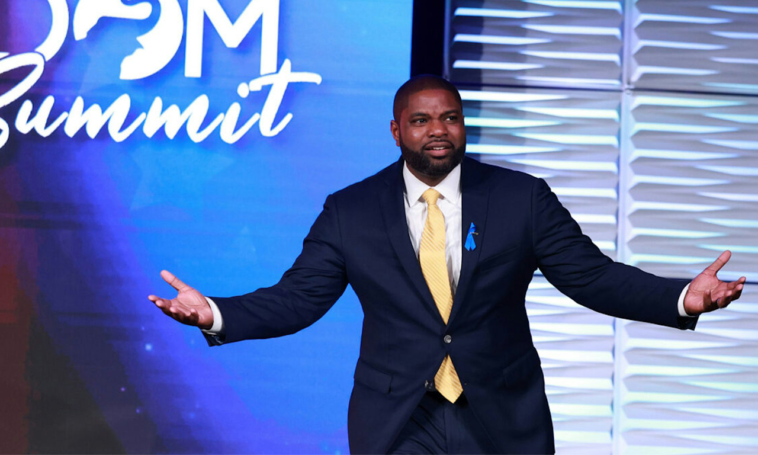Byron Donalds defends Trump over racial comment about black people.In the recent discourse surrounding remarks made by former President Donalds Trump regarding black voters and indictments, Congressman Byron Donalds emerged as a vocal defender of Trump’s statements.
The conversation, as aired on NBC’s “Meet The Press” moderated by Kristen Welker, provides insight into the complex intersection of race, politics, and perceptions of justice in America.
Donalds’ defense of Trump’s remarks reflects a broader narrative within conservative circles, where criticism of the justice system and perceptions of political persecution resonate deeply.
“I got indicted a second time, and a third time, and a fourth time. And a lot of people said that that’s why the black people like me, because they have been hurt so badly and discriminated against. And they actually viewed me as I’m being discriminated against,” Trump said.
His acknowledgment of the charged atmosphere in Columbia, South Carolina, where the remarks were made, served to soften the potential impact of Trump’s statement while redirecting attention to broader policy issues such as the economy and border security.
Welker’s pushback, highlighting the legal realities behind Trump’s indictments and the absence of evidence indicating political motivation, underscored the tension in the conversation. Donalds, however, remained steadfast in his defense, alleging systemic bias within the justice system and invoking broader narratives of political persecution. By aligning Trump’s legal challenges with broader perceptions of governmental overreach and injustices faced by black individuals within the justice system, Donalds attempted to rationalize Trump’s appeal to black voters beyond the surface interpretation of his remarks.
The accusation of racism leveled by Cedric Richmond further underscored the deeply entrenched partisan divisions within American politics. Donalds’ swift dismissal of Richmond’s critique as political maneuvring reflects a broader trend within contemporary political discourse, where accusations of racism and identity politics are often weaponized for electoral gain.
By reframing the debate as a partisan tactic, Donalds sought to delegitimize Richmond’s critique and redirect focus toward Trump’s perceived accomplishments as president.
Donalds refusal to be offended by Trump’s remarks highlighted a broader ideological divide regarding perceptions of racial sensitivity and political correctness. His repeated emphasis on Trump’s achievements and the purported desires of black voters to see justice served impartially portrayed Trump as a victim of a politicized justice system rather than an instigator of racial insensitivity. In doing so, Donalds sought to downplay the potential harm caused by Trump’s remarks while emphasizing broader themes of economic prosperity and national security under Trump’s administration.
The exchange encapsulates deeper tensions within American politics regarding race, justice, and representation. While Donalds positioned himself as a defender of Trump and his policies, his rhetoric also underscored broader ideological divides within the Republican Party and the electorate at large.
By framing Trump’s appeal to black voters in terms of shared concerns and disillusionment with the justice system, Donald’s attempted to bridge ideological gaps while reinforcing narratives of victimhood and political persecution.
Ultimately, the conversation reflects the enduring complexities of race and politics in America. Trump’s remarks, while provocative, serve as a lens through which broader issues of systemic injustice and political polarization come into focus.




2 Comments
Leave a Reply2 Pings & Trackbacks
Pingback:Lititia James taunts Trump about interest he owes on civil fraud judgment - Hard Knock News
Pingback:The Zeita Merchant to be 1st Black female rear admiral in US Coast Guard - Hard Knock News
Join the Community and Be a Part of the Conversation
You must be logged in or registered to post a comment.